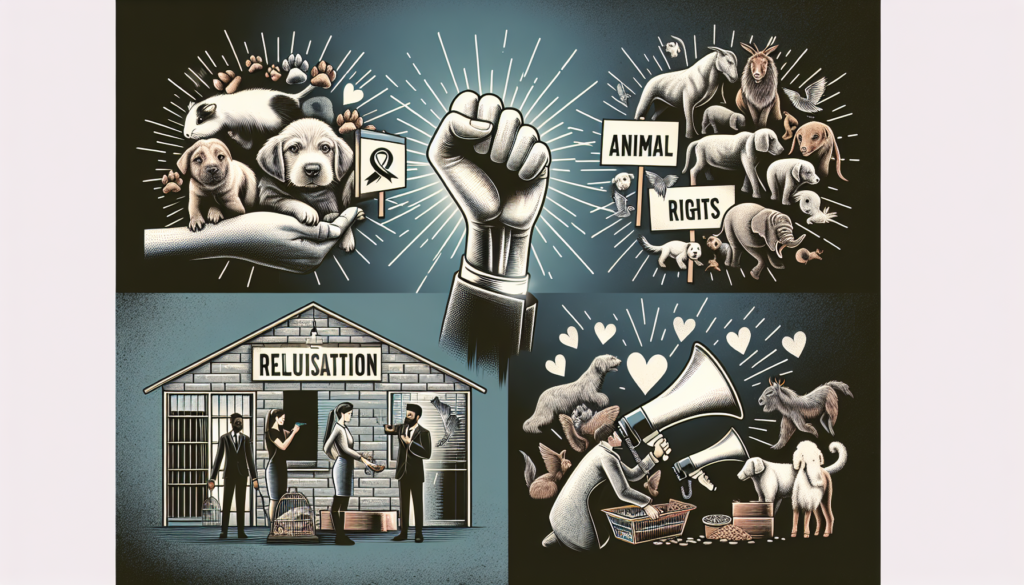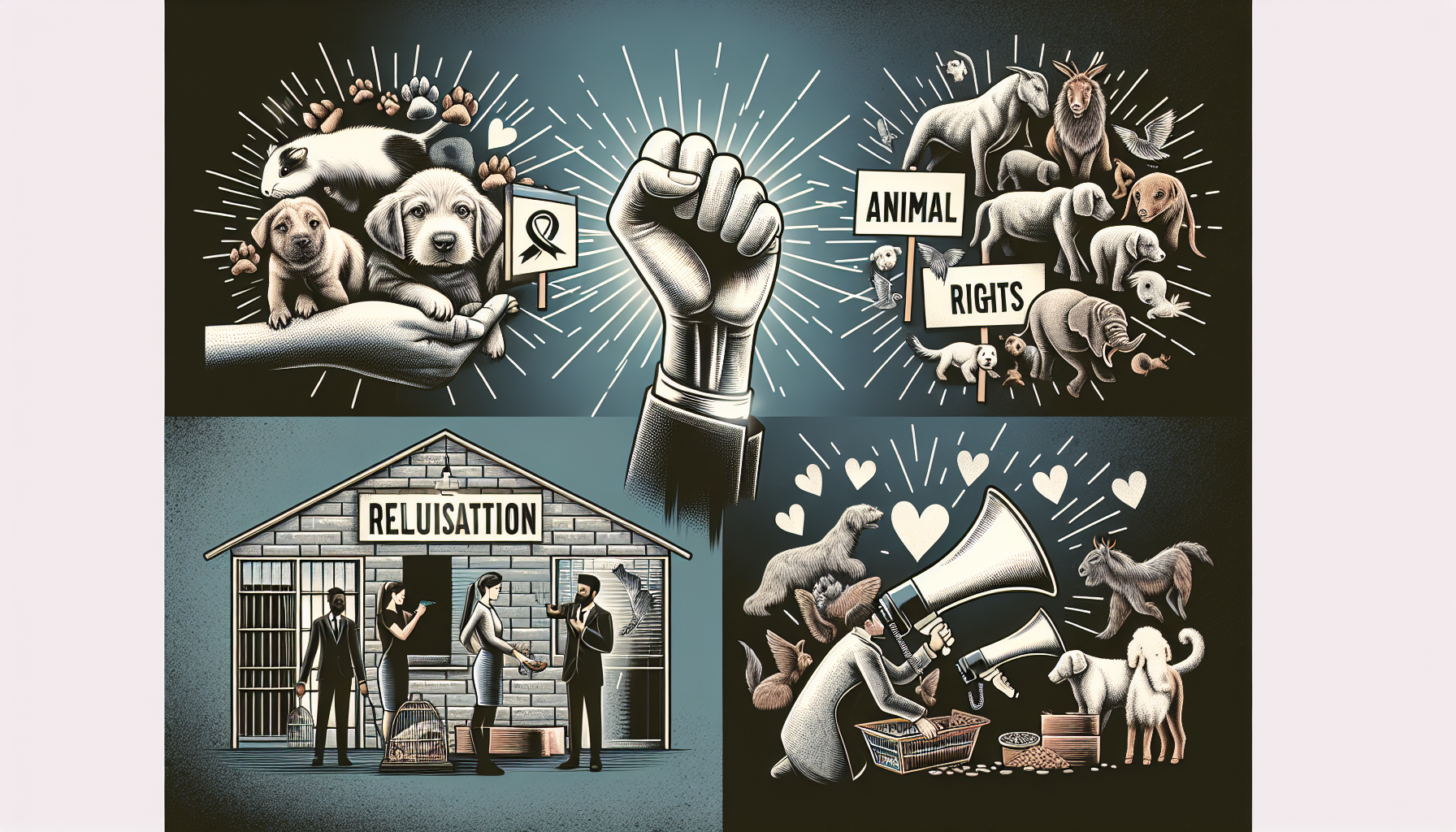If you have ever felt a strong sense of compassion for animals and want to make a positive difference in their lives, this article is for you. In this guide, you will discover practical tips and strategies on how to advocate for animal rights effectively. From spreading awareness to taking action, this paragraph will provide you with a sneak peek into a world where your voice can truly make a difference for our furry friends. So get ready to immerse yourself in the world of animal advocacy and become a powerful advocate for those who cannot speak for themselves.
Understanding Animal Rights
Animal rights refer to the belief that animals should be treated with respect, just as human beings are. It is the idea that animals are not merely property or resources to be used by humans, but individuals with their own inherent value. Animal rights activists argue that animals have the right to live free from unnecessary suffering and exploitation.
What are animal rights?
Animal rights encompass a set of moral and legal principles that protect animals from cruelty and exploitation. Animals should not be subjected to unnecessary harm, pain, or suffering, and they should have the right to live their lives in a way that is natural to their species. Animal rights activists argue that animals are sentient beings capable of feeling emotions and experiencing pleasure and pain.
Why advocate for animal rights?
Advocating for animal rights is crucial because it helps ensure that animals are treated with compassion and respect in our society. By advocating for animal rights, we are standing up against the unjust treatment and exploitation of animals for human gain. It is our responsibility to protect and advocate for those who cannot speak for themselves and to ensure that their rights are respected.
The importance of animal rights advocacy
Animal rights advocacy plays a vital role in creating a more compassionate and ethical society. By raising awareness about animal rights issues, we can mobilize society to take action and make positive changes. Animal rights advocacy also helps to encourage the adoption of laws and policies that protect animals and prevent cruelty. It is through advocacy that we can challenge societal norms and beliefs that perpetuate the oppression and mistreatment of animals.
Educating Yourself about Animal Rights
To effectively advocate for animal rights, it is essential to educate yourself about the issues surrounding animal rights and welfare.
Learning about different animal rights issues
There are various animal rights issues to be aware of, such as animal testing, factory farming, fur farming, and animal entertainment. By educating yourself about these issues, you can better understand the suffering and exploitation faced by animals in different industries. This knowledge will enable you to advocate more effectively and educate others about the plight of animals.
Understanding animal welfare vs. animal rights
While animal welfare and animal rights are related, they have distinct differences. Animal welfare focuses on the well-being and treatment of animals, ensuring they are not subjected to unnecessary suffering. Animal rights, on the other hand, go beyond welfare and argue for the inherent rights of animals. Understanding the difference between these two concepts is crucial in advocating for meaningful change for animals.
Researching scientific evidence supporting animal rights
Scientific research has provided compelling evidence in support of animal rights. Studies have shown that animals possess complex cognitive, emotional, and social abilities, making them more deserving of moral consideration. By staying updated on the scientific evidence supporting animal rights, you can strengthen your arguments and educate others based on factual information.

Joining Animal Rights Organizations
Joining animal rights organizations can provide a platform for collective action and amplify your advocacy efforts.
Finding local and global animal rights organizations
Start by researching and identifying animal rights organizations in your local area or globally. Many organizations focus on specific animal rights issues, such as wildlife conservation, animal rescue, or vegan advocacy. Joining such organizations allows you to work alongside like-minded individuals who share your passion for animal rights.
Researching organizations’ missions and values
Before joining an animal rights organization, take the time to understand their mission, values, and strategies. It is essential to align yourself with an organization that reflects your beliefs and goals. By researching organizations, you can find the ones that prioritize the same issues and approaches to advocacy as you do.
Choosing the right organization for you
Consider your interests, skills, and availability when choosing an animal rights organization to join. Some organizations may focus on political advocacy, while others may concentrate on grassroots initiatives or animal rescue. Determine which type of activism resonates with you and where you can offer the most significant contribution. Joining an organization that aligns with your passion and resources will maximize your impact and satisfaction as an advocate.
Supporting Animal Rights Legislation
Supporting animal rights legislation is an effective way to advocate for the protection and welfare of animals.
Keeping up-to-date with animal rights laws
Legislation regarding animal rights and welfare is continuously evolving. Stay informed about new laws and proposed legislation related to animal issues. Follow relevant news sources, animal rights organizations, and legislative bodies to ensure you are aware of any changes or opportunities to advocate for stronger animal protection laws.
Working to strengthen existing legislation
Advocate for the strengthening of existing animal protection laws by contacting your elected representatives and expressing your concerns. Collaborate with animal rights organizations to develop campaigns and petitions aimed at improving regulations and enforcement. By actively engaging with lawmakers and supporting efforts to strengthen legislation, you can help ensure that animals are better protected.
Advocating for the introduction of new laws
In addition to supporting existing legislation, advocate for the introduction of new laws aimed at further protecting animals. Work with organizations and legislators to propose new bills and ordinances that address specific animal rights issues. This proactive approach helps to create a legal framework that reflects the moral obligation to protect animal welfare and rights.

Promoting Ethical Consumerism
Ethical consumerism is a powerful way to support animal rights by making conscious choices in the marketplace.
Understanding the impact of your choices
Every purchase you make has an impact. By understanding how your choices as a consumer affect animals and the environment, you can make more informed decisions. Consider the impact of products on animal welfare, such as cosmetics tested on animals or clothing made from fur. Making ethical choices supports businesses that prioritize ethical practices and avoids supporting industries that exploit or harm animals.
Supporting cruelty-free and vegan products
Choose products that are cruelty-free and vegan whenever possible. Look for certifications, such as the Leaping Bunny symbol, which indicates that a product is not tested on animals. Similarly, opt for vegan alternatives that do not use animal-derived ingredients. By supporting cruelty-free and vegan products, you contribute to reducing animal suffering and demand for products that exploit animals.
Encouraging others to make conscious choices
Advocate for ethical consumerism by encouraging others to make conscious choices. Educate friends, family, and colleagues about the impact of their purchasing decisions on animals and the environment. Share information about cruelty-free and vegan options, and lead by example. By influencing others to adopt ethical consumer practices, you can collectively create a demand for more animal-friendly products and contribute to lasting change.
Raising Awareness through Social Media
Social media platforms provide a powerful tool for raising awareness and advocating for animal rights.
Creating impactful content about animal rights
Use social media to create and share content that highlights animal rights issues. Craft compelling and informative posts, videos, and graphics that engage your audience and prompt them to think critically about the treatment of animals. Share stories of animals in need, expose cruelty, and celebrate successful animal rights initiatives. Visual content showcasing the beauty and intelligence of animals can also help cultivate empathy and compassion among your followers.
Utilizing different social media platforms
Different social media platforms have unique features and audiences. Utilize platforms such as Facebook, Instagram, Twitter, and YouTube to reach a wider range of people. Tailor your content to fit each platform’s format and engage with your audience through comments, shares, and direct messages. By utilizing different platforms effectively, you can amplify your message and reach more individuals who may not have otherwise been exposed to animal rights issues.
Engaging with online animal rights communities
Join online animal rights communities and engage in discussions, sharing ideas, and supporting fellow activists. Participate in forums, groups, and social media communities that focus on animal rights. These communities provide a platform for collaboration, sharing resources, and learning from experienced advocates. By actively engaging with online communities, you can enhance your knowledge, gain support, and broaden your impact as an animal rights advocate.
Organizing and Participating in Protests
Protests are a visible and powerful way to draw attention to animal rights issues and advocate for change.
Planning peaceful and effective protests
Organizing a successful protest requires careful planning and consideration. Determine the purpose, location, and date of the protest while ensuring it remains peaceful and respectful. Establish clear goals and messages, and coordinate with local law enforcement to ensure safety during the event. Plan engaging activities, such as speeches, demonstrations, or artistic displays, that convey the plight of animals effectively.
Coordinating with like-minded individuals
Collaborate with like-minded individuals, animal rights organizations, and activists to coordinate protests. Join existing protests or create your own, and collaborate with others who share your passion for animal rights. By working together, you can pool resources, talents, and ideas to create impactful protests that amplify your message and increase the chances of effecting change.
Ensuring safety and legality during protests
Ensure that your protests are conducted in a safe and legal manner. Familiarize yourself with local laws and regulations regarding protests, permits, and public gatherings. Maintain an atmosphere of non-violence and respect, and strategize ways to handle potential counter-protestors or disruptions. By organizing protests that are legal, peaceful, and respectful, you can effectively advocate for animal rights while maintaining a positive image for your cause.
Supporting Animal Sanctuaries and Rescue Centers
Animal sanctuaries and rescue centers provide crucial care and refuge to animals in need. Supporting these organizations is a meaningful way to contribute to animal rights.
Finding local animal sanctuaries and rescues
Research and locate animal sanctuaries and rescue centers in your local area. These organizations provide shelter, food, medical care, and rehabilitation for animals rescued from abuse, neglect, or abandonment. Visit their websites, contact them directly, or attend local animal-related events to find out more about their work and how you can support them.
Volunteering or providing financial support
Animal sanctuaries and rescue centers often rely on volunteers and financial support to carry out their work effectively. Consider volunteering your time, skills, or expertise to these organizations. Whether it’s helping with cleaning, animal care, fundraising, or advocacy efforts, your contribution can make a significant difference. Additionally, financial contributions, such as donations or sponsorships, can help support the overall operation and sustainability of these organizations.
Assisting with animal rehabilitation and care
Depending on your skills and experience, you may be able to assist with animal rehabilitation and care at sanctuaries and rescue centers. This can involve providing physical care, such as feeding, grooming, and exercising the animals, or assisting with veterinary care or behavioral training. By actively participating in the care of rescued animals, you contribute directly to their well-being and recovery while supporting the mission of the organization.
Engaging in Grassroots Advocacy
Grassroots advocacy focuses on creating change at the local level through community engagement and education.
Building relationships with local communities
Engage with your local community by attending events, hosting workshops, and networking with like-minded individuals. Establish relationships with local businesses, schools, and community organizations to collaborate on animal rights initiatives. By forging connections and building trust within your local community, you can effectively raise awareness and create a more compassionate society for animals.
Organizing workshops and community events
Organize workshops, seminars, or community events that focus on animal rights and welfare. These events can provide education, resources, and interactive activities that engage and inform the community. Speakers, documentaries, and hands-on experiences can all be incorporated to create impactful and insightful events that inspire action and advocacy.
Educating others about animal rights
One of the most essential aspects of grassroots advocacy is educating others about animal rights. Utilize different platforms such as school visits, public talks, or online webinars to educate people about the ethical treatment of animals. Tailor your presentations to different audiences, highlighting the specific issues relevant to their lives and communities. By empowering others with knowledge and information, you can inspire them to become advocates for animal rights themselves.
Engaging with Politicians and Decision Makers
To effect significant change for animals, it is crucial to engage with politicians and decision-makers who have the power to influence policy and legislation.
Contacting and meeting with elected officials
Reach out to your elected officials by contacting them through phone calls, emails, or letters. Express your concerns and viewpoints about animal rights and welfare. Request meetings to discuss these issues and present evidence-based arguments that support your stance. It is essential to establish relationships with politicians and decision-makers to ensure they understand the importance of animal rights and consider animals’ well-being in their decision-making process.
Presenting animal rights concerns and goals
When meeting with politicians and decision-makers, clearly articulate your concerns and goals regarding animal rights. Present data, scientific research, and real-life examples that demonstrate the need for change. Highlight the ethical, environmental, and health-related consequences of current practices and provide alternative solutions that prioritize animal welfare. By presenting well-reasoned arguments and compelling evidence, you can influence their perspectives and advocate for policies that protect and respect animals.
Influencing policy and decision-making
Through consistent engagement and advocacy efforts, you can influence policy and decision-making processes. Work with animal rights organizations to develop and promote legislative proposals that address key concerns and enhance animal protection. Stay informed about upcoming policy discussions, public hearings, and voting sessions relevant to animal rights issues. By actively participating and providing input during these processes, you can advocate for animal-friendly policies and effect tangible change in society.
In conclusion, advocating for animal rights requires a multifaceted approach that encompasses education, activism, and community engagement. By understanding animal rights issues, joining organizations, supporting legislation, promoting ethical consumerism, raising awareness on social media, organizing protests, supporting animal sanctuaries, engaging in grassroots advocacy, and influencing policy and decision-makers, you can make a significant impact in the fight for a more compassionate and just world for animals. Remember, your voice has the power to advocate for those who cannot speak for themselves, and together, we can work towards a society that respects and protects the rights of all living beings.

